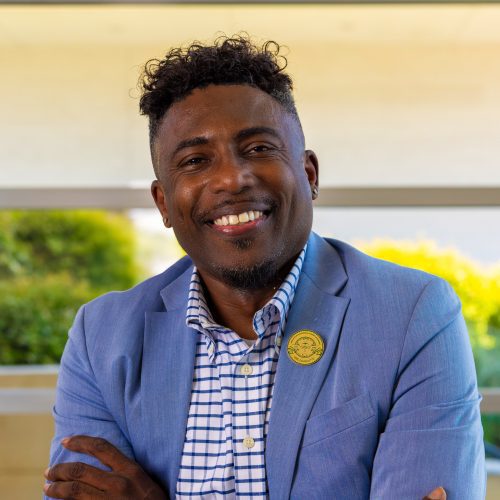S.L. Ivey

- Current Graduate Program: Master of History & Master of Public Administration
- Concentration/Area of Emphasis: Nonprofit Management
- Program Schedule: Full-Time
- Delivery Method: Hybrid
- Current Employer: UNC Charlotte
- Position: Teaching Assistant
- Anticipated Graduation: May 2026
- Undergraduate Institution: UNC Charlotte
- Undergraduate Degree: B.A. in Political Science
- Favorite Place in Charlotte: Garinger Hall History Department’s Graduate Student Lounge
- Hometown: Charlotte, North Carolina
- Dream Job: Federal Public Defender
What has been the best part of your academic experience so far?
The best part of my academic experience so far has been the history department’s infamous colloquium courses. Picture this: we read one book per week, write a paper that argues with the author (politely, of course… most of the time), and then spend hours in class debating whether the book is brilliant, trash, or both at once. It’s like a weekly intellectual boxing match, but with footnotes.
The real magic, though, is the community it builds. My history classmates have basically become my family—we have a group chat that goes off daily with everything from research rants to meme therapy. We challenge each other, hype each other up, and occasionally remind each other to eat and sleep. Honestly, the camaraderie makes the long nights of reading and writing not just bearable, but actually fun. And that’s saying something when you’re speed-reading your fifth dense monograph of the month.
Are you involved in any research projects? If so, can you briefly describe your research and its potential impact?
Yes—I’m knee-deep in a master’s thesis that keeps me up at night (in a good way). It’s titled “Benevolent Bullies: How U.S. Presidents FDR and LBJ Unpacked American Democracy.” Basically, I study how Franklin D. Roosevelt and Lyndon B. Johnson used both policy and rhetoric to strong-arm their visions of democracy into the American psyche. I call them “benevolent bullies” because, while they pushed hard, they did it for causes like Social Security and civil rights—policies that still define how Americans understand government today.
The impact? Well, if I do my job right, people will see how the speeches, stories, and strategies of these two presidents continue to shape our expectations of democracy—sometimes for better, sometimes for worse. And who knows, maybe my research will even give future politicians a crash course on how to inspire people without, you know, bulldozing them.
What are some of your favorite activities or places to visit in Charlotte outside of campus?
As a double major, a teaching assistant, and the graduate student body president, the concept of “free time” is more mythical than real—like Bigfoot or a perfectly functioning group project. That said, when I do escape campus, my favorite thing to do is attend 12-step recovery meetings. I’m in long-term recovery—3-plus years from substance abuse, and helping others walk through the steps has become both my grounding practice and my greatest joy.
Most of the time, you can find me meeting with my sponsees in Charlotte restaurants—turns out nothing pairs better with working the steps than a plate of fries. These conversations are sacred to me, and they remind me that growth, like sobriety, is a daily practice. So while I may not have a ton of “leisure” time, I get something better: a community that keeps me laughing, accountable, and endlessly inspired.
Have you found any mentors during your time at UNC Charlotte? How have they influenced your academic and professional journey?
I’ve been lucky enough to find two incredible mentors at UNC Charlotte: Dr. Tina Shull and Dr. Benny Andrés. Both are brilliant American history scholars, and both have shaped me in ways that go far beyond the classroom.
Dr. Shull was actually the reason I even got into the history program in the first place. I read her book “Detention Empire: Reagan’s War on Immigrants and the Seeds of Resistance” and then somehow convinced her to spend two hours over coffee talking about it with me. I like to think my enthusiasm helped my admission chances—but maybe it was just the caffeine. She’s a staunch egalitarian who refuses hierarchy so much that she insists we just call her “Tina.” It’s both empowering and slightly terrifying to call your professor by her first name when you’re still sweating over footnotes.
Dr. Andrés, on the other hand, toughened me up the old-fashioned way—by giving me a string of C’s on my book reviews until I finally learned how to write one properly. Thanks to his guidance, I went from “What even is a thesis?” to earning an A in his course. He was also the first professor I ever worked for as a teaching assistant, teaching me how to grade fairly, lead discussions, and always put students first. Between Tina’s anti-hierarchical wisdom and Dr. Andrés’s tough love, I’ve basically been raised in grad school by the perfect academic odd couple.
What advice would you give to someone considering applying to your program?
Get ready to write and talk—a lot!